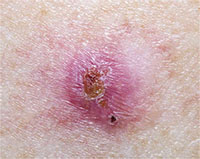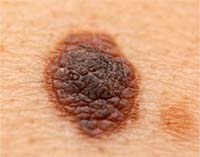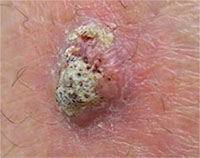Skin cancer is the most common cancer diagnosis, affecting more than one million Americans each year. In fact, according to The Skin Cancer Foundation, just five bad sunburns over the course of your life doubles your risk of developing cancer. The good news? If diagnosed and treated early, 99% of skin cancer cases are curable.


Whether you spent your days working outdoors, your summers worshipping the sun, or your winters in a tanning bad, it’s important you visit Cobb Dermatology & Aesthetics in Lynchburg annually for your Skin Check. During your skin screening and mole check, board-certified dermatologist Dr Carrie Cobb will learn about your health history and habits before examining your skin, including your scalp, nails and feet, to check for features of abnormal moles, such as asymmetry, irregular borders, changes in color, size or texture.
If signs of cancer are detected, Dr. Cobb will recommend next steps, which may include monitoring, biopsy, removal, or a referral to a specialist for further evaluation and treatment.
Skin cancer can strike anyone, regardless of age or race. However, if you have any of the following risk factors, it’s important to make a yearly skin cancer screening a must-do.


Menanoma – Melanoma is the most serious form of skin cancer because it has a tendency to spread. Knowing the ABCDE warning signs of melanoma can help you identify suspicious moles and marks when performing a self-examination.
A is for Asymmetry – One half of the mark is unlike the other half.
B is for Border – The mole or spot has an irregular or jagged border.
C is for Color – The color of the mark varies from one area to the next.
D is for Diameter – Most melanomas are about the size of a pencil eraser.
E is for Evolving – The spot has started to change in size, shape or color.

Squamous Cell Carcinoma – Squamous cell carcinoma appears as a firm, thickened bump that may become red or scaly. Often, the sore heals and re-opens.
Cobb Dermatology & Aesthetics in Central Virginia recommends that you should get checked for skin cancer by a dermatologist each year once you reach middle age or earlier if you have a family history of the disease. And of course, if you do notice an irregular mole, spot or mark that causes concern, please contact Dr. Carrie Cobb’s clinic at 434-947-5321 as soon as possible to schedule your skin cancer early detection screening.